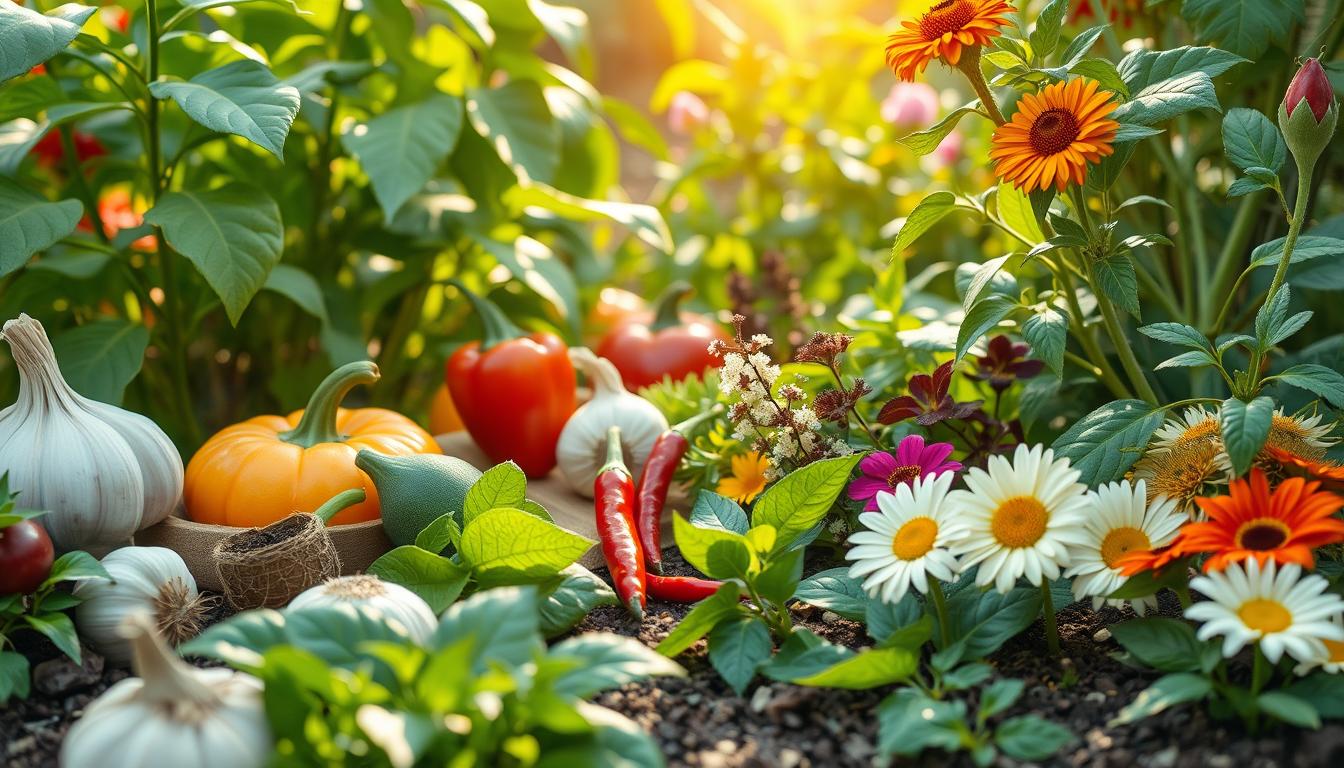I love finding natural ways to keep garden pests away. As a gardener, I’ve found that organic pest control is better for the planet and my plants. Many gardeners in the U.S. are choosing natural remedies for this reason.
Chemical pesticides harm the environment, so I turned to natural solutions. Natural remedies keep my plants healthy and safe from harm. This way, my garden stays free from dangerous chemicals.
I think natural remedies are the future of gardening. In this article, I’ll share organic pest control methods and non-toxic solutions. Whether you’re new to gardening or experienced, I aim to help you choose natural remedies for your garden.
Understanding the Importance of Natural Pest Control
As I explore gardening, I’ve learned how vital natural pest control is. Studies show it’s often more effective than chemical pesticides. This makes it a top choice for gardeners. Using eco-friendly methods helps us avoid harsh chemicals and keeps our plants healthy.
Why Choose Natural Remedies?
Natural remedies, like homemade pest repellents, are safer than chemicals. They’re made from everyday items, saving money and the planet. Some examples include:
- Neem oil
- Garlic spray
- Soap solution
Environmental Benefits of Going Natural
Choosing natural pest control cuts down on chemical pollution. This helps our plants and keeps important insects like bees safe. It also keeps our gardens balanced and thriving.
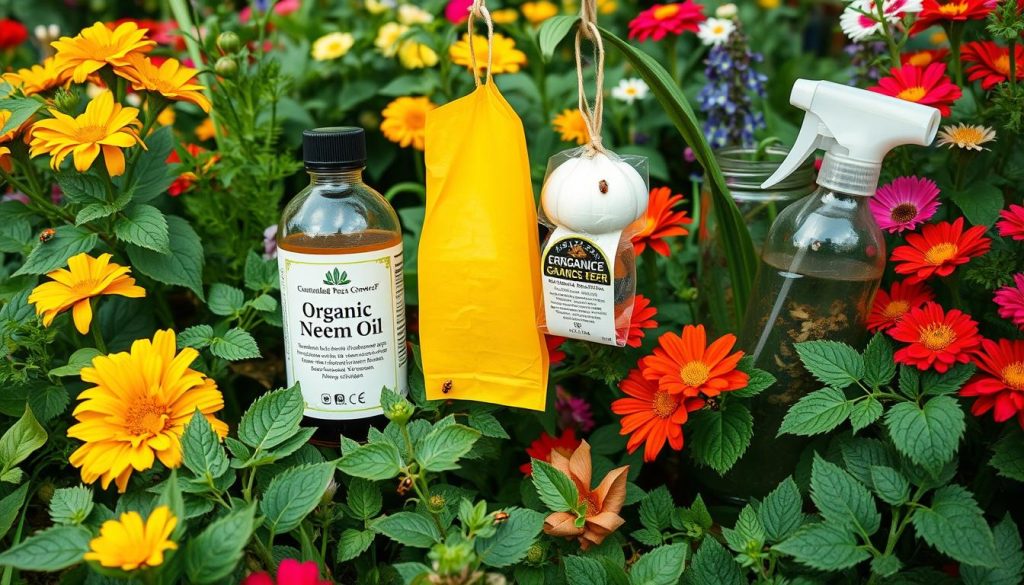
Common Garden Pests and Their Impact
Exploring natural remedies for garden pests, I’ve learned that knowing common pests is key. Aphids, whiteflies, and spider mites can harm plants a lot. They weaken plants, making them more likely to get sick and grow less.
It’s important to watch your plants for pests. Look for signs like white patches, sticky honeydew, or webs. Early detection helps stop pests from spreading. Natural solutions like neem oil or insecticidal soap can control pests without harming the environment.
Identifying Common Intruders
- Aphids: small, soft-bodied insects that feed on plant sap
- Whiteflies: tiny, winged insects that feed on plant sap and can transmit diseases
- Spider mites: tiny, spider-like insects that feed on plant sap and can cause yellowing or bronzing of leaves
Using natural pest control helps your garden grow strong. It keeps pests in check and supports your garden’s health. I’m excited to share more tips for a pest-free garden.
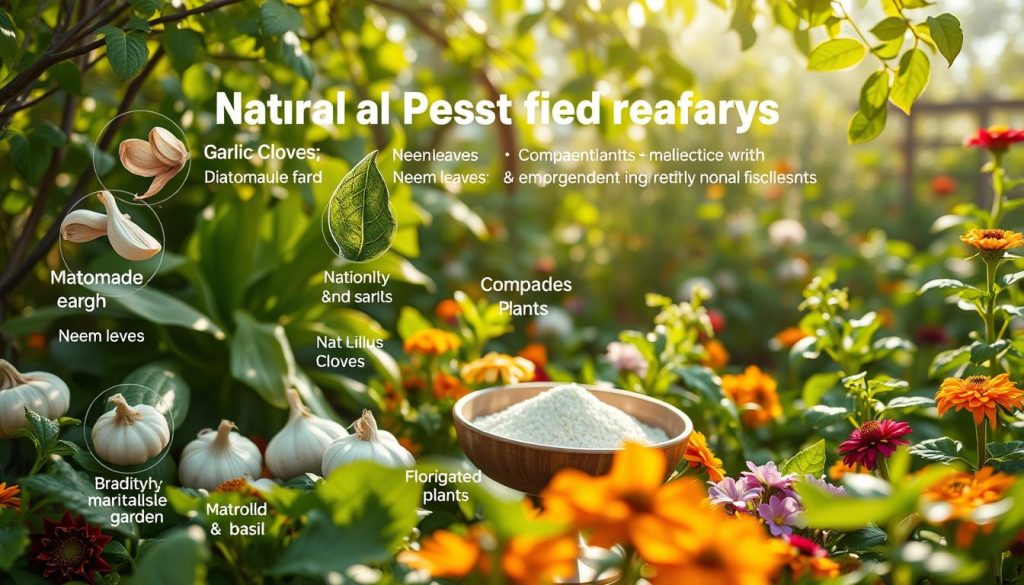
The Damage They Cause to My Plants
Pests can really hurt your plants, from slowing growth to making them sick. By controlling pests early, you can protect your garden. With natural remedies, you can have a healthy garden and a great harvest.
| Pest | Damage | Natural Remedy |
|---|---|---|
| Aphids | Reduced plant growth, curled leaves | Neem oil, insecticidal soap |
| Whiteflies | Transmit diseases, reduce plant growth | Yellow sticky traps, neem oil |
| Spider mites | Yellowing or bronzing of leaves, reduced plant growth | Insecticidal soap, neem oil |
Essential Oils: Nature’s Pest Deterrent
I’ve found that essential oils are great for keeping pests away from gardens. They are a safe choice for gardeners who care about the environment. These oils are a natural way to protect plants without using harmful chemicals.
Top Essential Oils for Pest Control
Peppermint, lemongrass, and tea tree oils are top picks for pest control. They can keep pests like aphids and whiteflies away. Here are some of the best essential oils for the job:
- Peppermint oil: repels aphids, spider mites, and other pests
- Lemongrass oil: repels mosquitoes, flies, and other insects
- Tea tree oil: repels fungal diseases and pests like aphids and whiteflies
How to Use Essential Oils in the Garden
To use essential oils in your garden, mix a few drops with water. Spray it on plants to keep pests away. You can also use a diffuser or spray it around your garden’s edges. This way, you can keep your garden safe and healthy without harming the environment.
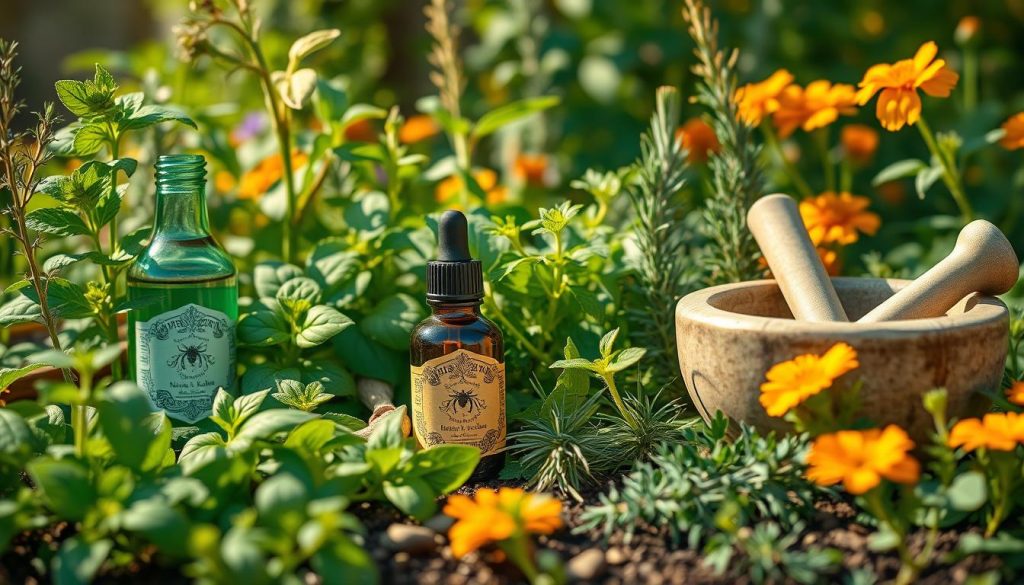
Homemade Sprays: Crafting My Own Solutions
Making my own pest repellents is fun and keeps my garden safe. I mix soap, water, and essential oils to create sprays. These sprays are easy to make and don’t harm the environment or my family.
Using natural bug control remedies is safe and effective. I’ve tried different recipes, like ones with neem oil, garlic, and hot peppers. These ingredients help fight pests like aphids and spider mites.
Simple Recipes for Effective Pest Sprays
- Neem oil spray: Mix 2 tablespoons of neem oil with 1 quart of water and spray on plants to control aphids, whiteflies, and other pests.
- Garlic spray: Blend 3 cloves of garlic with 1 quart of water and spray on plants to repel aphids, spider mites, and other pests.
- Hot pepper spray: Mix 1 teaspoon of hot pepper sauce with 1 quart of water and spray on plants to repel pests like aphids, whiteflies, and spider mites.
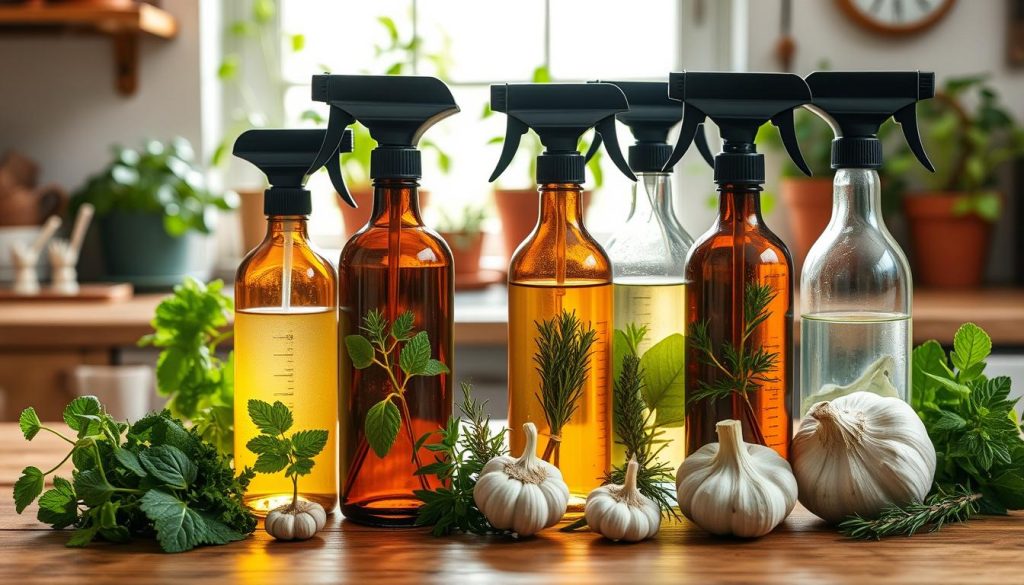
Tips for Application and Frequency
Applying homemade pest sprays right is key. I spray in the early morning or evening and do it every 7-10 days. This keeps my garden healthy and pest-free, supporting a balanced ecosystem.
Attracting Beneficial Insects
To keep a garden healthy, it’s key to attract good bugs. These insects help fight off pests. I’ve learned to make my garden welcoming to them. This way, I use natural methods to keep pests away.
Why Ladybugs and Lacewings Matter
Ladybugs and lacewings are great for gardeners. They eat aphids and whiteflies, which harm plants. By drawing these bugs to my garden, I cut down on harmful chemicals.
How to Create a Bug-Friendly Environment
To make my garden bug-friendly, I’ve added plants like marigolds and dill. Here’s how to attract good bugs:
- Plant a mix of flowers and herbs that attract beneficial insects
- Make sure there’s water, like a shallow dish or birdbath
- Stay away from chemical pesticides, which hurt good bugs
By doing these things, I help my plants and the beneficial insects that visit. It’s a win-win for everyone.
| Beneficial Insect | Preferred Plants | Pest Control Benefits |
|---|---|---|
| Ladybugs | Marigolds, dill, and cosmos | Feed on aphids, whiteflies, and other pests |
| Lacewings | Angelica, fennel, and coriander | Feed on aphids, whiteflies, and other pests |
Companion Planting: Nature’s Defense System
I’ve been looking into natural ways to keep bugs away from my garden. Companion planting is a great method. It involves planting certain plants together to keep pests away and help each plant grow better.
The Best Plant Pairings for Pest Control
Some plants work well together to keep pests away. For example, marigolds and basil can keep nematodes and whiteflies off. Tomatoes and basil, and roses with garlic, are also good pairs. These combinations help make a strong and diverse garden.
My Experience With Companion Planting Success
I’ve seen how well companion planting works. I’ve planted marigolds, basil, and tomatoes together. This mix has kept pests away and helped my plants grow strong. I’ve also used garlic to fight off aphids and other pests, and it’s worked great.
Here are some tips for using companion planting:
- Plant marigolds with tomatoes to repel nematodes
- Use basil to repel whiteflies and other pests
- Pair roses with garlic to repel aphids and other pests
Companion planting is a natural way to keep bugs out of your garden. It’s effective and doesn’t harm the environment. This method helps me avoid using harmful chemicals and keeps my garden healthy and balanced.
| Plant Pairing | Pest Repelled |
|---|---|
| Marigolds and Tomatoes | Nematodes |
| Basil and Tomatoes | Whiteflies |
| Roses and Garlic | Aphids |
Utilizing Natural Traps for Pests
I’ve been looking into natural ways to keep pests out of my garden. I found that homemade pest repellents work well. One cool method is using natural traps made at home. These traps are simple to make and help keep pests away.
DIY traps for slugs and snails are really effective. I mix beer and yeast to make a trap. It attracts and kills these pests without harming the environment. For instance, I bury a beer-filled container in the soil. Slugs and snails crawl in and drown.
Effective DIY Traps
- Beer traps: Fill a container with beer and bury it in the soil to attract and eliminate slugs and snails.
- Yeast traps: Mix yeast with sugar and water to create a solution that will attract and trap pests.
- Copper traps: Use copper tape or mesh to create a barrier that will repel slugs and snails.
These natural traps are not only effective but also simple to make. By using homemade pest repellents, my garden stays healthy and balanced.
Maintaining Garden Hygiene to Reduce Pests
Keeping your garden clean is key to avoiding pests. A tidy garden makes it hard for pests to find a home. Eco-friendly pest management helps keep your garden balanced and healthy.
Cleaning up debris is a big step in garden hygiene. Get rid of dead leaves, twigs, and other organic matter that pests like. This action helps prevent pests and promotes plant health. Using non-toxic pest solutions like neem oil and diatomaceous earth is also effective.
Cleaning Up Debris to Deter Pests
- Remove dead leaves and twigs from the garden
- Dispose of any infested or diseased plants
- Keep the garden floor clear of debris
Proper watering is also important for garden hygiene. Too much water can attract pests, while too little can stress plants. Eco-friendly methods like drip irrigation help keep your garden healthy and pest-free.
The Role of Proper Watering Techniques
Good watering habits can stop pest problems by keeping the garden dry. Using non-toxic solutions like soaps and oils can control pest numbers.
Reflecting on My Pest Control Journey
Looking back, I feel proud and determined. Thenatural remediesI’ve used have worked well againstgarden pests. These pests once threatened my plants’ health and growth.
Success Stories with Natural Remedies
One highlight was using a homemade essential oil spray against aphids. The pests vanished in days, and my plants looked green again. I’ve also attracted beneficial insects like ladybugs and lacewings. They help fight off harmful pests.
My Lessons Learned and Future Plans
I’ve learned thatorganic pest controlis a continuous effort. It needs flexibility and a desire to learn. I’m eager to share my findings and encourage others to try sustainable gardening.
In the future, I aim to learn more about companion planting. I also want to try advanced natural traps and keep my garden clean. This will help prevent pests.

